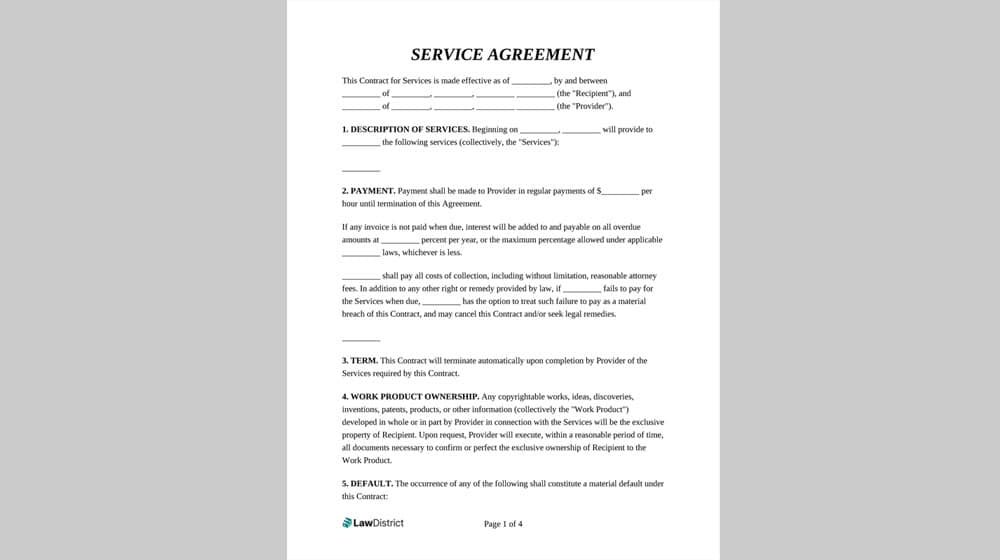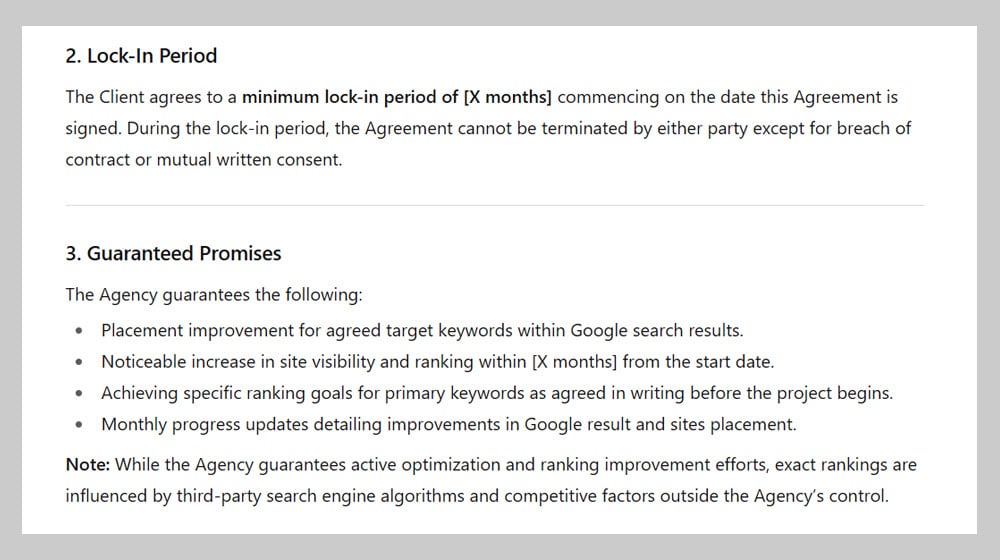Red Flags in SEO and Content Agency Service Agreements

There are a million content marketing and SEO agencies out there. Some of them are very, very good, but others are basically scams in a pretty hat. How do you tell the difference and avoid the bad ones?
A big part of it comes in reading and understanding the contract. While I'm not going to get too lawyery here – I'm not a lawyer, after all, and I don't want to give legal advice – I can point out some of the more worrying clauses you might need to watch out for.
What Does a Service Agreement Look Like?
What does a normal service agreement look like? Well, it's a contract, so it will look like a bunch of legalese. It might be fairly simple and only 1-2 pages long, or it might be more complex and resemble a EULA in how long it is.

Typically, a service agreement will cover some common topics.
The statement of work. This is a rundown of the various tasks that the content marketing agency is going to provide to its clients, and it sits right at the top of the contract. Whether it's blog posting, social media management, outreach to third-party sites, technical SEO and optimization, or other services, they'll be outlined here.
This will likely get into some specifics. It won't necessarily just say "provides blog posting services"; it might say "provides three published blog posts per week" or other specifics. There should be no surprises here; when you negotiate with a content agency, you'll figure out the specifics of what you want and what they'll provide, and this sheet just pins that down. Some agencies just have defined packages you can order, which will have a standardized form.
A contract glossary. Smaller agencies might skip this, while larger agencies almost always have it. It's basically just a small glossary of important terms that need to be defined throughout the contract.
What is a "blog post"? If your agency handed you a 500-word post, would that be good enough for you? That's why these terms are defined.
The standard terms. Many agencies hammer out a generalized contract, and then have modifiers that adapt it to the specific needs of individual clients. This is so that 90-95% of the basics are the same across all clients, and only the details, like specific fees, contract length, timing, volume, and extra services, are individualized.
Client obligations. What is your role in all of this? You'll generally have some responsibilities in order for the agency to do its job. They'll need access to your blogging CMS and your social media, maybe your paid ads systems, and your brand info.
You'll generally have legal clauses here, such as intellectual property clauses and limitation of liability clauses, which are standard to most contracts. You'll retain control over your intellectual property and can even include confidentiality agreements for sensitive business information.
Termination clauses. Are there specific processes to go through for the termination of the contract? Early termination fees? Return of assets or access? These kinds of details go here.
The specific wording of all of these different sections can vary. Something written up by a small agency's owner will look a lot different from a template spun out by a mid-sized business, which will look a lot different from a lawyer-drafted contract for an enterprise.
Speaking of…
Should You Get a Lawyer to Review Your Contract?
If you're about to sign on with a content marketing agency, should you get a lawyer to review the contract for you?
The choice is yours. I will say this: it won't hurt. A lawyer might be a little expensive for their time, and you want to make sure you're talking to one familiar with contract law so they know what is and isn't allowed in a contract, and what might be sketchy.

I will also say that, as a client, if you hold off on signing and say, "I'll need a couple of days to have my lawyer look this over", the reaction you receive will be telling. If you say that to me, I'll toss you a thumbs-up and praise the decision. Some larger agencies expect it as a matter of course, and might even be surprised if you sign before doing so.
If, on the other hand, the agency starts to get evasive or pressures you to sign right away ("oh it's a standard contract, no need to waste money on a lawyer, we can work out any details later if necessary") they might be trying to get you to not notice something sketchy in the contract.
I do still recommend giving the service agreement a read yourself, even if you're planning to have a lawyer read it, so you can spot anything that looks off ahead of time.
What Are the Red Flags in a Content Marketing Service Agreement?
So, what sorts of things should you look for in the contract?
Formalized promises they can't possibly keep. If the contract includes something like guaranteed results from services that don't normally have them, it's a sign they're not on the up and up. Guaranteed #1 results in Google, guaranteed placement on sites with heavy editorial control - these aren't the kinds of results a marketer can guarantee without something underhanded involved.

Obviously, if the agency wants to lock you into a long contract and refuses to promise results, that's also bad. So what's the middle ground?
Usually, what you want to see is something related to deliverables and KPIs. My link earning service, for example, will never claim guaranteed links, but it also doesn't lock you into a long contract. Moreover, I include demonstrable results and reports on the efforts I'm making on your behalf.
Vague, unclear, or off-base definitions for services. A big one is if the services they promise to provide in the contract don't match the services you've talked about. If I tell you I'll be writing one 2,000-word blog post for you each week, but my contract says a "blog post" is 500 words, that disconnect is a red flag.
Why does this happen? Maybe it's language that hasn't been updated in years. Maybe the agency wants to charge you 4x the cost of a "blog post" for a 2,000-word post. Maybe they're just planning to provide super short posts. Red flag city!
Asking for access to systems they shouldn't need. This might not be in the contract or service agreement, but the access your agency asks for should be in line with the services they'll provide. If you're getting blogging services from me, I need access to your CMS, but I don't need access to your paid ads, Google Business Profile, or social networks. Unless, of course, you're having me manage those for you as well. The contract should be reflective of the scope of services.
This can be hand-waved away through a generic clause, so keep that in mind. All the contract really needs to say is that you need to provide access to accounts necessary to do the work you're hiring the agency to do, and leave the details up to the specific situation later.
Exploitative contract terms. Bad agencies often have you locked into long contracts, spanning a year or multiple years. This is generally accompanied by early termination fees, ranging from paying out the remainder of the contract to steep penalties. Early termination fees are legal and can be surprisingly steep, so you want to make sure you know what's written in the document before you sign.
Forced use of the agency's infrastructure. A good content marketing agency shouldn't need you to migrate your site, especially not to anything custom or anything they own. If they're trying to move you over to their own web hosting, their custom CMS, or anything of the sort, it's a move meant to increase friction for cancellation and make it harder to transition to other management.
Retained ownership over content. Another common red flag in the worst marketing companies is the company trying to retain ownership over the assets and content they produce for you. When I write a blog post for you, it's yours. Part of why you're paying me is for the rights to the content to be transferred to you. If you cancel the contract, I'm not going to pull down the posts I wrote for you, because I don't own them; they're yours.
Unfortunately, some agencies will try to retain ownership of what they produce. It's another of those friction points meant to discourage cancellation. If you cancel, you lose your blog! That's awful! It's even worse if they then do a "content audit" and find "mistakes" with your old content and "fix" them, and now count your old content among "their" assets.
I also highly recommend that you familiarize yourself with common marketing and SEO scams. Many of these aren't actually written into contracts or formalized in that way, so just looking at the contract won't fully insulate you from bad actors.
When a Clause Isn't as Bad as You Might Think
Every so often, you'll see some posts circulating on social media or surging up in the news cycle about some exploitative clause in a contract, EULA, or terms of service, and people get outraged over it.
One recent example comes from Ubisoft.

People dug through their EULA and found a clause that demands the destruction of physical copies of games purchased from the company, upon cancellation of the contract.
"Upon termination for any reason, You must immediately uninstall the Product and destroy all copies of the Product in Your possession."
This sounds extremely brazen and terrible, but it's actually very common; it's in dozens of other game company EULAs and tons of software companies besides.
This is a pretty bad clause, but it's never enforced, and it's basically unenforceable. Moreover, it's just from template EULAs people have been using for years, stemming primarily from products where access and use are meant to be restricted and where such a clause is more reasonable. While people are right to get up in arms over it, it's not really productive because it's not a clause that would ever realistically matter.
Another is one that circulates on Facebook every so often. You see posts that are highly persuasive and convincing, about how Facebook or META has changed its terms of service and now owns all your photos and content!
Well, this usually comes from people misreading a clause in the Facebook terms of service that stipulates you give Facebook the ability to use and reproduce content and images you upload to the platform.
Well, yeah; if you want them to be public and visible to other people, they need to be hosted and displayed by Facebook. Without that clause, social media wouldn't exist, from a legal perspective.
Now, there's a whole other debate over whether or not Facebook is allowed to scrape everything on their platform to train AI on, but that's a different matter I'm not going to get into here.
My overall point is that sometimes, a clause in a contract can look scary or exploitative or like a red flag, when it's actually just a template or industry standard clause, or it's something that's required for the service to operate.
It would be like a clause in my agreement that lets me use your logo. If you want any of the graphics I produce for your blog to be watermarked with your logo, I'd need to be able to use your logo, right? That doesn't mean I can then go and use your logo for anything else I want. (This is a hypothetical example; I don't actually need to include that kind of clause to produce graphics for you.)
If you want to see what a sensible contract looks like, or just want to discuss the details, drop me a line. I'm happy to discuss mine (especially if you're up for signing it, hint hint), and I thrive on transparency. Let me show you how it's done, and done right.










Comments